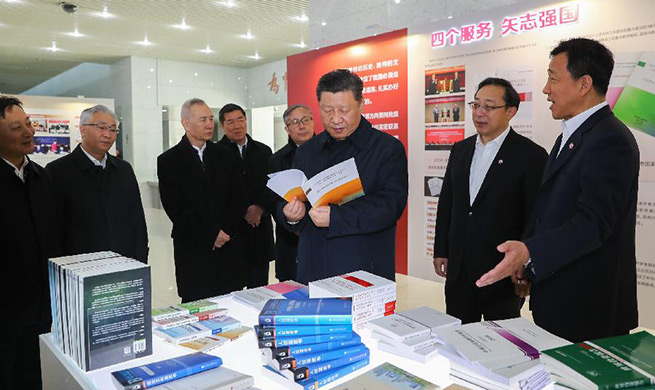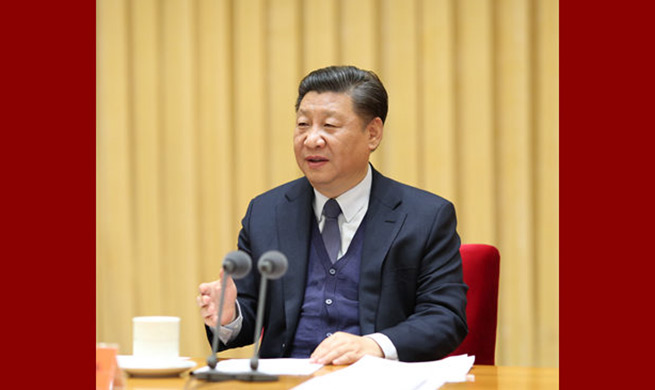By Alessandra Cardone
ROME, Jan. 17 (Xinhua) -- The Italian cabinet on Thursday approved the necessary criteria for implementing a universal basic income scheme and a pension reform, two flagship measures included in the last budget.
They will provide economic support for the poor, and allow workers to retire earlier, fulfilling two key pledges respectively made by now governing populist Five Star Movement (M5S) and rightwing League in the campaign.
"These two measures are not a response to extemporary electoral promises, but represent a social and economic policy of which our government is proud," Prime Minister Giuseppe Conte stressed at a joint press conference late on Thursday.
SUPPORT FOR THE POOR
According to the details unveiled after the cabinet meeting, a basic income up to 780 euros (888 U.S. dollars) a month will be granted to single deprived people living in a rented home.
The amount will grow up to 1,080 euros for a couple with a child, 1,280 euros for a couple with three children, and up to a maximum of 1,330 euros for a family of three adults and three children.
Those who owned their home would not benefit from a rental contribution (ranging between 150 and 280 euros) included in the sum.
The measure will enter into force in April, and last 18 months. It will cost some 7 billion euros in 2019, and 7.8 billion euros in 2020, according to M5S leader and vice Prime Minister Luigi Di Maio.
"This measure does not encourage welfare dependency, on the contrary it fosters re-integration in the job market," Di Maio told journalists at the press conference.
He explained the cabinet defined clear rules to avoid people abusing the basic income scheme.
Those benefitting from the support would receive job offers from the public unemployment service, which they would not be allowed to reject under penalty of losing their right to the basic income forever.
The recipients will also be asked to sign a "pact for work" or "pact for training" -- according to their professional profile and the skills they need to re-enter the job market -- and to contribute up to 8 hours per week to social works in their municipalities.
Tax breaks would be given to companies hiring those who were benefitting from the basic income, the M5S leader also explained.
According to cabinet's estimates, the basic income will benefit about 5 million people, some 47 percent of whom living in northern and central Italy and 53 percent in the south.
The figure corresponded to the latest data provided by the National Institute of Statistics (ISTAT) in 2018, which showed some 5 million individuals (or 1.8 million families) living below the economic standards defining extreme poverty.
It represented 8.3 percent of Italy's 60-million population.
PENSION SYSTEM OVERHAUL
The second flagship measure will modify a pension reform implemented by the previous center-left government in 2011, which had raised the retirement age to 67.
Under the new rules, workers will be allowed to retire earlier than that, and specifically when their age and the years of their pension contributions combined amount to 100.
For example, this would make possible for a worker to retire as early as at 62, if he or she has 38 years of contributions paid.
A further rule will allow some female workers to retire as early as at 58 (or 59, in case of self-employed), if they have at least 35 years of pension contributions.
The measure would cost 22 billion euros for the 2019-2021 period overall, according to League leader and vice Prime Minister Matteo Salvini.
"I am happy and proud that we have moved from words to deeds," Salvini said, speaking alongside PM Conte and Di Maio.
Salvini explained this measure could not be cumulated with any salary or self-employed earnings, but for occasional revenues up to 5,000 euros per year.
"It will concern up to about 1 million people in the period 2019-2012," Salvini added.
This provision will enter into force in April for workers in the private sector, and in August for public workers. (1 euro = 1.14 U.S. dollars)













